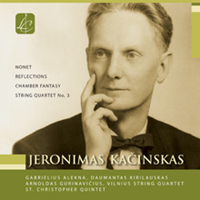Jeronimas Kačinskas was an exclusive personality in the history of the Lithuanian music. His oeuvre fell into deliberate oblivion in Lithuania right after he fled West in 1944, and remained forgotten up to the end of the Soviet occupation. Likewise, his outstanding activity of promoting modern Lithuanian music in the period between the two world wars was intentionally ignored. Despite that, the last twenty years have been marked by diverse efforts to bring Kačinskas’ music back to concert stages and into the musicological discourse.
In 2008, the Lithuanian Music Information and Publishing Centre released two volumes of Kačinskas’ choral scores alongside the CD of his choral music recorded by the Jauna Muzika Chamber Choir, lead by Vaclovas Augustinas. Those were the projects dedicated to the centenary celebration of the composer’s birth.
Following that release, a second CD was launched by the LMIPC in 2010 to add more colours to the artistic portrait of the composer. This compilation of the Lithuanian Classics series introduces Kačinskas’ chamber music covering a large period of his creative biography. The famous Nonetto (1932, 1936) serves as a starting point in the chronologically-structured recording which reveals changes of the composer’s style over the years. Despite the fact that Kačinskas’ musical language tends to moderation, influenced by plenty of prosaic circumstances, the composer has maintained his distinctive touch of style which he himself labelled as “athematicism”.
Nonetto, the central piece of the CD, was commissioned by the Czech Nonetto and premiered in Czechoslovakia in 1932. Written for woodwind and string instruments, the composition was applauded by critics and audiences alike. Alois Hába, professor of the Conservatory of Prague and an advocate of the microtonal music, even hailed the Nonetto as one of the best examples of the European modern music. In Lithuania, however, the composition received a controversial reaction igniting fierce discussions amid the country’s musical society largely submerged in a bleak routine at that time. Despite that, the Nonetto was selected to represent Lithuania at the annual festival of the International Society for Contemporary Music in 1936.
Reflections (1957) is an elaborate four-part composition and one of Kačinskas’ few opuses for piano which requires outstanding technique. The score combines impressionist concepts and American technicism with transcendent perspectives. In this CD, the composition is interpreted by Gabrielius Alekna, one of Lithuania’s renowned piano players who has presented this rarely performed piece at a number of concerts.
Chamber Fantasy (1981) for flute, piano and string quartet, and String Quartet No. 3 (1993) are among most popular pieces of the composer. These compositions were brought to Lithuanian and international audiences by the Vilnius String Quartet which has also made the recordings for this CD.
All the recordings for this release were made between 2007 and 2009 at the Grand Hall of the Lithuanian Philharmonic in Vilnius. The compositions are interpreted by the country’s best instrumentalists and ensembles, including Gabrielius Alekna and Daumantas Kirilauskas (piano), Arnoldas Gurinavičius (double-bass), Vilnius String Quartet and St. Christopher Woodwind Quintet. Sound engineering by Vilius Kondrotas and Mikhail Omeljančuk.
LMIPC info

